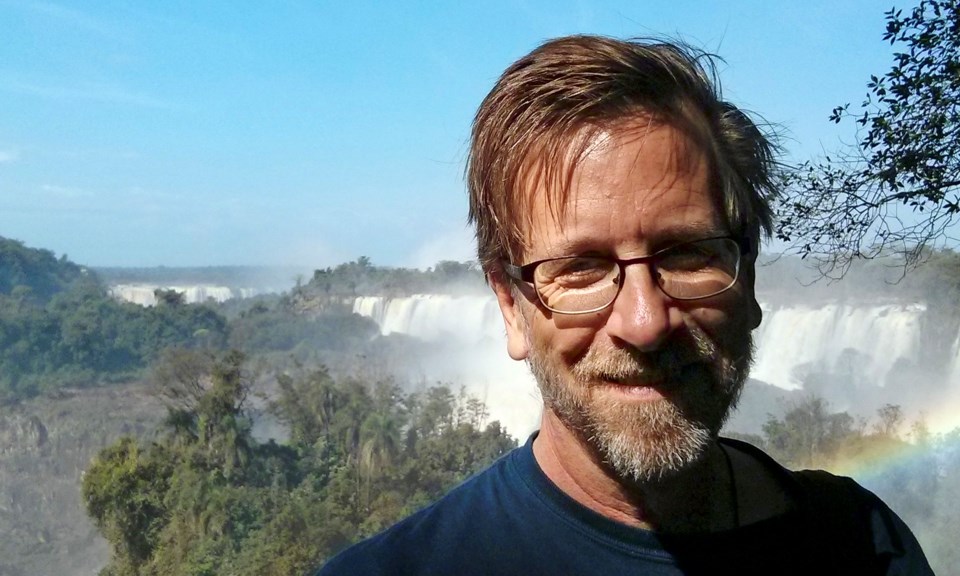The ecological crisis is a spiritual crisis, says a renowned theologian coming to Â鶹´«Ă˝Ół»this weekend.
Douglas Christie, a professor of theological studies at Loyola Marymount University in Los Angeles, blames environmental degradation on human habits of consumption and a lack of feeling for other living beings, including other people.
“These can be understood in the deepest sense as reflecting a kind of spiritual alienation,” Christie said in a phone interview before his arrival here. “We are alienated from ourselves. We are alienated from one another. We are alienated from the world. To make ecological change and transformation have any chance of enduring, it feels important to examine the deeper sources of our alienation. You can use the word spiritual to describe that. You don’t have to, there’s other language you can use, but I think it’s useful.”
Christie’s forte is contemplative ecology, which he describes as having a consciousness of the larger reality ever-present in one’s life and the world around us.
“Contemplative practices show up in almost every major world religion, Christianity included, so there’s also a more specialized meaning that contemplative has,” he says. “It involves certain spiritual disciplines or practices. Sometimes it involves solitude, sometimes it involves silence, stillness, and often these practices are developed in communities, say monastic communities or other intentional communities, so that contemplative practices become a way of shaping a life, a human life, as well as the life of the community.”
But contemplative practice doesn’t have to be complicated.
“It has a simple meaning,” he says. “Paying attention, being aware and living out of that awareness, especially in relation to the natural world.”
Confronting climate change and other potential ecological catastrophes requires all sorts of responses, he says, but contemplative practices can be an important part.
“I think we need a full-blown social, political shift — and an economic shift, for that matter — that will help us reorient the way we live so we’re not doing so much harm to the planet,” Christie says. “I also feel it’s important, even as we’re trying to identify those shifts, that we pay attention to the deeper sources of our own unease, our own inattention to the world. So contemplative thought and practice is meant to be a help in that larger process.”
Christie’s recent book is The Blue Sapphire of the Mind: Notes for a Contemplative Ecology. The title reflects the words of Evagrius of Pontus, a fourth-century monk, who wrote, “If anyone should wish to see the condition of the mind, let him deprive himself of all mental representations, and then he will see the mind similar to sapphire or to the colour of Heaven.”
“Some people say that [Evagrius’] spiritual thought comes very close to Buddhism in some ways,” Christie says. “He advocated individualist prayer, for example, an approach to prayer that pushes beyond all images, all language, that pushes into something dark, that requires us to kind of stand in the unknown and the unknowable. He uses the expression that when the mind is transformed through spiritual practice, it comes to shine like sapphire.”
Christie clarifies that the ancient use of the term that we translate as “mind” goes beyond the contemporary meaning of our rational mind and means instead the deepest centre of our souls.
“We have this capacity to become luminous beings, open to the whole reality where everything is kin to us,” he says. “I just love that image, the blue sapphire of the mind, so that’s the image that I chose to ground the book.”
That will be the theme of a public talk Friday night. An all-day retreat Saturday at the Canadian Memorial Church and Centre for Peace (canadianmemorial.org) will address the topic “The Need for Roots: Cultivating a Sense of Place.”
The sense of place, which is relevant in ecology, is also significant, he says, in the struggle for 21st-century people to find a spiritual place. There are plenty of people who subscribe to a theology that is “spiritual but not religious,” which can make it difficult to situate oneself in a community of like-minded people.
“I’m very sympathetic to the kind of hunger that gets expressed in all kinds of new and interesting ways, not necessarily connected to religious traditions,” he says. “But I’m also aware – and you see this often and I feel myself sometimes — it’s hard to find a community sometimes if everything is moving in front of you, everything’s up for grabs, if everybody’s spiritual path is kind of self-invented. People do, I think, find that seeking and finding community can be challenging in that kind of climate.”
His own approach does not follow a straight line. It is rooted in Christian tradition, but is influenced by others as well.
“I made a great effort to open up the canvas as widely as I could and to listen to voices from far beyond the Christian tradition, who are, I believe, offering us a similar kind of contemplative orientation to the natural world,” Christie says. “The book is actually set up as a kind of sustained conversation or dialogue among and between Christian contemplatives and poets, writers, artists, natural historians, ecologists, philosophers who are not at all identifying themselves as Christians but who are trying to see the world deeply and carefully. I’m creating what I hope is a contemplative space that is infused with Christian thought and imagination but not limited to it.”
@Pat604Johnson



